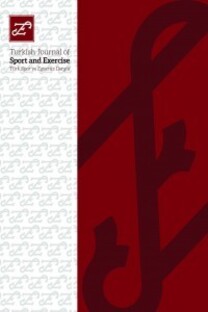Assessment of the Brand Attitudes of Taekwondo Coaches and Referees
The objective of this study is to examine and interpret the brand attitudes of the coaches and referees who take part in contests actively in our country and were included in the 2017 season activity schedule of Turkish Taekwondo Federation and who attended the Coaches and Referees Improvement Seminar held in Antalya on December 11-19, 2017. The study group consists of 346 coaches and referees who took part in the mentioned improvement seminar in the 2017 season. In the study conducted on the basis of the survey model, Brand Attitude Questionnaire developed by Polat (2007) was used. In the evaluation of the data and in finding the calculated values, SPSS 16,0 statistics package program was used. Data were summarized by providing the percentages, averages, and standard deviations. As the data were distributed normally, an independent group t test was used for the double group comparisons and One-way Variance Analysis (ANOVA) was used for the multiple group comparisons. Upon the conclusion of the ANOVA study, Tukey HSD multiple comparison test was used to determine the source of the significant differences. In the scope of this study, the scale reliability coefficient was calculated as 0.89. In the study, the significance level was taken as 0.05 In conclusion of the study, and upon the scrutiny of the Brand Attitude Questionnaire point averages of the referees and coaches participating in the study as per the variables of gender, economic level, and sportive experience period, no statistically significant level of differentiation was observed in all the subcategories, while statistically significant differences were found in some subcategories according to the variables of age and marital status.
Keywords:
Brand Attitude Taekwondo, Coach, Referee,
___
- 1. Burnaz Ş, Esgin N. (2003). Assessment of the Products Newly Launched on the Market by Way of Brand Expansion in terms of Consumers. Pazarlama Dünyası, (5): 23-30.
- 2. Cemalcılar İlhan (1994). Marketing-Concepts, Decisions. Beta Publications, Istanbul.
- 3. Hill L, O’Sullivan T. (2004). Foundation Marketing. 3rd Ed. London, Prentice Hall,
- 4. Kotler P, Armstrong G. (2004). Principles of Marketing. Pearson Education International, 10th Ed. New Jersey.
- 5. Oh J, Fiorito SS. (2002). Korean Women’s Clothing Brand Loyalty. Journal of Fashion Marketing and Management, 6 (3): 206-222.
- 6. Polat E.(2007) Concept of Brand and Attitude of Sportspeople toward a Brand. Gazi University Health Sciences Institute Physical Training and Sports Department Postgraduate Thesis, Ankara
- 7. SB Çavuşoğlu (2011). Reasons for Preferring Sportive Products and Brand Selection. Academic Journal of Information Technology 2:3:7-18.
- 8. Shank MD. (2005). Sport Marketing: A Strategic Perspective. 3rd Int. Ed. New Jersey, Prentice Hall Inc.
- 9. Wagg, S., Goldberg, A. (ed.) (1991) British Football and Social Change, Leicester: University Press, 239-253.
- Başlangıç: 1999
- Yayıncı: Selçuk Üniversitesi, Spor Bilimleri Fakültesi
Sayıdaki Diğer Makaleler
Assessment of the brand attitudes of taekwondo coaches and referees
Yusuf BARSBUĞA, Tuncay SARIİPEK, İ. Bülent FİŞEKÇİOĞLU
Examination of the physical profiles of physically handicapped female badminton players
Ferhat ESATBEYOĞLU, Mark CAMPBELL
Mental skill usage of athletes with physical disabilities
Ferhat ESATBEYOĞLU, Mark CAMPBELL
Mahdi REZAGHOLIZADEH, Abbas SADEGHI, Naser Naghi BEIGHLO, Peyman FARSI
